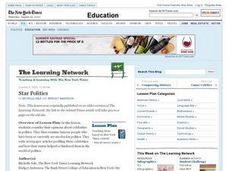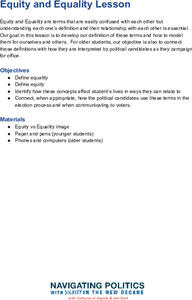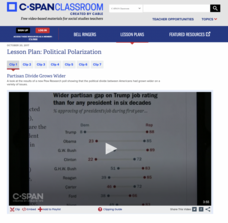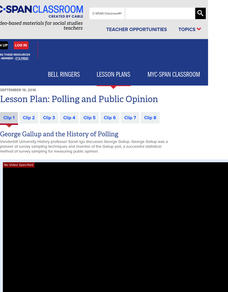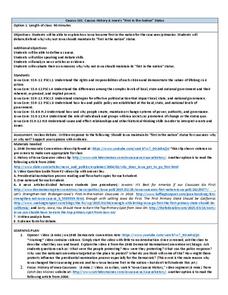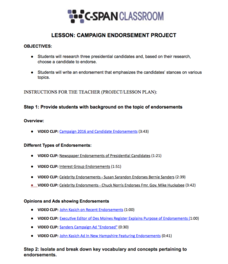Curated OER
Star Politics
Students discuss the advantages of a celebrity running for a public office. After reading an article, they examine the results of the California governor recall vote. In groups, they research the aspirations and career of a celebrity...
Curated OER
The Union is Perpetual: Lincoln is Elected
Middle schoolers view primary documents about the race for President in the time of Abraham Lincoln. For this election lesson, students prepare arguments for and against Lincoln using an analysis sheet. Middle schoolers create a poster...
Curated OER
Where Will You Be November 2?
Students consider reasons why many Americans do not vote in national elections and explore the increase in new registered voters. They research a particular demographic and create an advertisement encouraging members of that group to vote.
Curated OER
Dropping (and Adding) Names in Washington
Students research and create profiles of key figures in the current administration and those people who are speculated to play a role if George W. Bush is re-elected in the 2004 election.
Curated OER
Utah's Legislative Branch: How a Bill Becomes a Law
Seventh graders discover how a bill becomes a law in Utah. In groups, they decide on a law they would like to see enacted and discuss its chances of being passed by the legislative branch in Utah. They hold elections in which each...
Curated OER
Progression of Political Movements
Students examine the various political parties throughout history. In groups, they are given documents identifying the platforms of the parties in the 1868 election. To end the lesson plan, they share their information with the class...
Curated OER
Where Do They Stand?
In this presidential election worksheet, students research the 2008 presidential candidates and create a booklet of candidate profiles that clearly differentiate each one. They also assume the identity of one of the candidates and hold a...
Curated OER
All Aboard The Campaign Train!
Learners explore campaign politics. In this political campaign lesson, students investigate multimedia sources in order to examine the structure of political parties and platforms from previous presidential elections. Learners then...
Curated OER
Close Encounters of the World Kind
Explore the vocabulary of the government process. Using a simple technique, learners discuss the meaning of the words majority, election, democrat, republican, and independent. This can be used as an anticipatory set.
Curated OER
Political Parties, Platforms, and Planks
Ninth graders examine the origins and functions of political parties. In this American Government lesson, 9th graders create a party platform to address political issues that are likely to arise during a national election. Students...
Curated OER
Taking Poll Information
Students investigate the election and poll surveys. In this statistics lesson, students take poll information and analyze the data. They graph their data and make predictions and conjectures.
Curated OER
Texas Kid Writes Book About Presidents
Arranged into small groups, learners read a paragraph of the news story "Texas Kid Writes Book About Presidents." As one reads, others mark the text (underlining important information and writing notes in the margin of the story). After...
C-SPAN
Should Your State Modify Its Voter Registration Laws and Methods for Submitting a Ballot?
What is the balance between democracy and security? Using articles and videos that examine state voting procedures, learners explore the difficult question. After looking at voting regulations in their state and nationally, they consider...
Teaching Tolerance
The True History of Voting Rights
Explore what voting rights really are in an intriguing activity that explores the history of American voting. The resource examines the timeline of voting rights in the United States with group discussions, hands-on-activities, and...
Cultures of Dignity
Equity and Equality Lesson
Equality does not equal equity and this lesson explains why. Class members compare two images--one labeled "Equality" and the other "Equity." Using the provided discussion questions, they then develop definitions that distinguish between...
Constitutional Rights Foundation
Slavery and the Electoral College
How did slavery mold the creation of the US Constitution? The final lesson in the series focuses on how slavery impacted the creation of the Electoral College. Academics learn how the Electoral College was created because Southern states...
C-SPAN
Political Polarization
Dive into the political breach with pupils and explore the reasons for political polarization. Using clips from C-SPAN that include discussions from reporters and scholars, class members consider what is causing the political fault lines...
C-SPAN
Polling and Public Opinion
Polls are ubiquitous in American politics, but just how reliable and equal are they? A video-driven resource helps learners discuss the question by examining what pollsters and pundits say. Extension activities involve evaluating the...
Jane Addams Project
Woman Suffrage
Suffragettes, suffragists, and anti-suffragists. A two-day, richly detailed lesson plan has young historians investigate the twentieth-century suffrage movement. Groups examine primary and secondary source materials about Jane Addams and...
Center for Civic Education
Becoming a Voter
What are the requirements to register to vote in the United States? Young citizens evaluate this process by working with handouts, informational texts, discussion, and research, as well as complete a sample voter registration form.
Caucus 101
Caucus History and Iowa’s “First in the Nation” Status
What is a caucus? Why is Iowa's first? Why did Iowa shift to the caucus format? After researching these basic questions, class members debate the question of whether or not Iowa should maintain its "first in the nation" status for caucuses.
C-SPAN
Campaign Endorsement Project
So many politicians, so many endorsements! Learn to differentiate between facts as well as the process of endorsements with an informative resource. Class members watch current endorsement videos, research candidates from three different...
Facing History and Ourselves
Laws and the National Community
When it comes to the law, is justice always served? Teach scholars about how law sometimes enables prejudice of entire groups of people with a unit on World War II that includes a warm-up activity, analysis of primary sources,...
West Virginia Department of Education
A State of Convenience: The Creation of West Virginia
Ever wondered why there is a West Virginia but not an East Virginia? The resource answers questions like this one and more as it takes an in-depth and detailed look at the history of West Virginia and how it became a state. Several...
Other popular searches
- Election Day
- Presidential Elections
- Election Day for Kids
- 2008 Presidential Election
- Voting and Elections
- Election of 1860
- Election 2008
- 2nd Grade Election Day
- Mock Election
- Election Day Activities K 3
- Abraham Lincoln Election
- 2008 Elections


